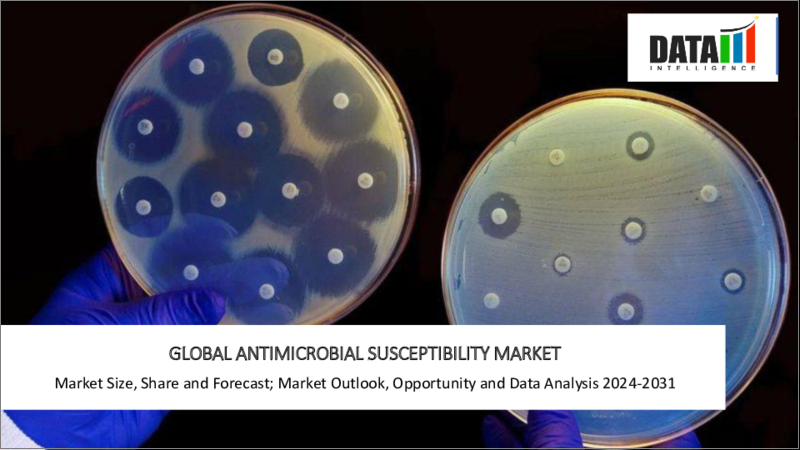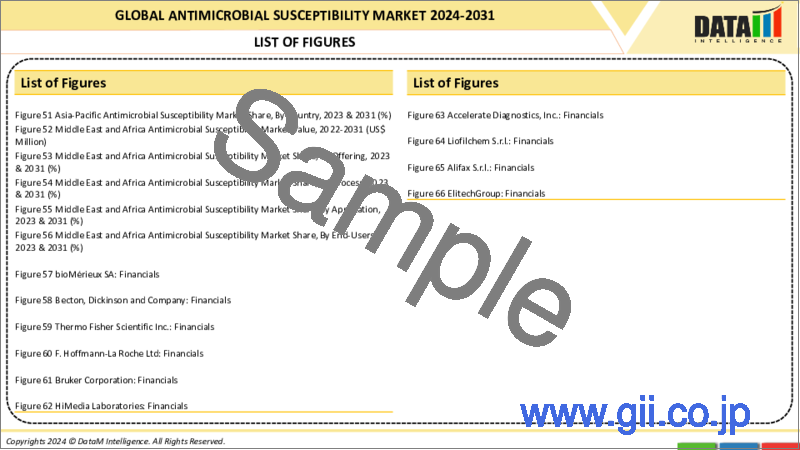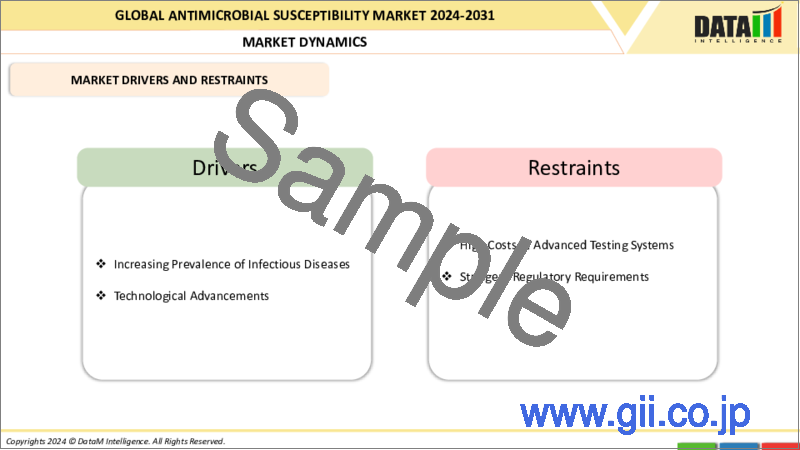|
|
市場調査レポート
商品コード
1542912
抗菌薬感受性試験の世界市場:2024~2031年Global Antimicrobial Susceptibility Testing Market - 2024-2031 |
||||||
カスタマイズ可能
適宜更新あり
|
|||||||
| 抗菌薬感受性試験の世界市場:2024~2031年 |
|
出版日: 2024年08月26日
発行: DataM Intelligence
ページ情報: 英文 200 Pages
納期: 即日から翌営業日
|
- 全表示
- 概要
- 目次
世界の抗菌薬感受性試験の市場規模は、2023年に34億6,754万米ドルに達し、2024~2031年の予測期間中にCAGR 5.9%で成長し、2031年には54億3,020万米ドルに達すると予測されています。
抗菌薬感受性試験(AST)は、個々の患者にとってどの抗菌薬レジメンが特に効果的かを判断するために、医療技術者や臨床試験技師によって実施される試験技術です。この試験は、病院、診療所、および感染症の管理・予防のための国家プログラムによって提供される治療サービスの評価に役立ちます。
抗菌薬感受性試験の力学
世界の抗菌薬感受性試験市場の成長は、技術の進歩、感染症の流行増加、政府や民間組織からの研究開発資金の増加、ヘルスケアインフラの進歩によってもたらされます。
世界の抗菌薬感受性試験ニーズの高まりが市場成長を牽引
抗菌薬耐性(AMR)は、世界の公衆衛生にとって大きな脅威となっています。世界保健機関(WHO)によると、抗生物質耐性は世界のすべての地域で危険なほど高いレベルにまで上昇しており、罹患率と死亡率の上昇につながっています。さらに、世界銀行は、薬剤耐性感染症が世界経済危機を引き起こし、2050年までに毎年2,800万人が極度の貧困に陥り、世界経済全体で年間1兆米ドルのコストがかかると見積もっています。
AMRの出現と蔓延を抑制するためには、抗菌薬に対する耐性を正確かつ迅速に検出し、適切な抗菌薬治療を行うことが重要です。細菌感染症を治療するための最良の選択肢は、すべての臨床微生物学的試験室の日常業務の一部であるASTの結果に依存しています。報告書は、地域の抗菌薬感受性パターンを理解し、ヘルスケア専門家が最も効果的な抗生物質療法を選択するのに役立ちます。例えば、ある病原体のAMR率が20%を超えている場合、その薬剤は感染症治療のための単一の経験的治療として投与されるべきではないです。
さらに、市場プレーヤーは買収や製品上市などの市場戦略を採用しています。例えば、2022年4月、BIOMERIEUXはSpecific Diagnosticsの買収に合意しました。米国を拠点とするこの非公開会社は、血液培養陽性菌から直接表現型ASTを提供する迅速抗菌薬感受性試験(AST)、SPECIFIC REVEAL Rapid ASTシステムを開発しました。さらに2020年2月、Bio-Rad Laboratories, Inc.は、試験結果の妥当性と一貫性を確保するための診断製品の開発・製造会社であるExact Diagnosticsを買収しました。Exact Diagnosticsの買収により、Bio-Rad Laboratories, Inc.は、移植、呼吸器、ウイルス学、微生物学、性感染症、媒介感染症における分子品質管理製品の包括的なカタログを入手できるようになった。
抗菌薬感受性試験製品/機器の欠点が市場の成長を妨げる
しかし、コストが高いことに加え、分子学的手法の主な欠点は、利用可能なプローブによってのみ標的となる耐性遺伝子が検出されること、および耐性遺伝子が必ずしも耐性表現型の発現と関連しないため耐性が過大評価されることです。さらに、自動化および半自動化システムには固有の利点と限界があり、結果は抗菌薬、ソフトウェアのバージョン、カードによって大きく異なります。そのため、システムによっては特定の薬剤の感受性プロファイルを正しく分類できず、感受性のカテゴリーを誤って分類してしまうことがあります。また、接種量が少ないと、これらのシステムの結果に大きく影響し、誤った感受性が報告されるようです。
COVID-19による抗菌薬感受性試験市場への影響分析
COVID-19パンデミックの間、AMRパートナーシップに取り組む能力が制限され、資金が減少し、看護、医療、および公衆衛生スタッフの利用可能性が減少したため、AMRサーベイランス、予防、および管理に影響が及びました。臨床試験標準化機構(CLSI)の2020年報告書によると、患者が感染症に罹患しているかどうかを判定し、ウイルスや細菌の感染源を特定し、病因物質とその感受性プロファイルを特定するための迅速診断が決定的に必要とされています。試験室は、疑われる病原体を迅速に特定し、治療に対する感受性を判定することで、ペースの速い環境における適切な初回臨床判断を導くことができます。これにより、個々の転帰が大幅に改善されるだけでなく、不必要な抗生物質の使用を避けることができます。さらに、手指消毒薬や表面クリーナーなどの消毒薬の使用が増加することで、病原微生物における抗菌薬耐性の割合が今後増加すると予想されています。
抗菌薬感受性試験市場分析
予測期間中(2024~2031年)、自動試験機器分野が最も速いCAGRで成長する見込みです。
製品タイプ別:
感受性試験ディスク
MICストリップ
感受性プレート
自動試験機器
消耗品
方法別:
ブロス希釈法
迅速自動化法
ディスク拡散法
勾配拡散法
分子試験法
試験タイプ別:
抗菌
抗真菌
抗寄生虫
その他
用途別
臨床診断
創薬・医薬品開発
その他
エンドユーザー別
診断センター・病院
製薬・バイオテクノロジー企業
CRO(医薬品開発業務受託機関)
研究・学術機関
自動試験機器分野が最大の市場シェアを占めています。2022年にAntibiotics Journalに掲載された論文によると、迅速なASTのための現在の技術は、微量希釈感受性試験に基づく自動化および半自動化装置を含め、市場で利用可能です。例えば、Phoenix Systemは広く受け入れられており、臨床微生物試験室で同定と抗菌薬感受性試験に使用されています。感受性測定の原理は、酸化還元指示薬(アラマーブルーまたはレザズリン色素)を使用し、様々な濃度の抗菌剤の存在下で細菌の増殖を検出することに基づいています。また、MicroScan WalkAway plusシステムは、広範囲のグラム陽性およびグラム陰性好気性細菌に対して、正確かつ迅速な同定と感受性の結果を提供します。
さらに、市販されているMicroScan WalkAwayシステムの第一世代はAutoSCAN-3です。新バージョンの装置Auto-ACAN-4とAutoSCAN-WalkAwayは改良され、冷蔵を必要としないドライパネルを使用しています。AutoSCAN-WalkAwayシステムは細菌の酵素活性を検出し、96枚のパネルを同時に処理できます。AST用の高度で自動化されたシステムの利用可能性は、世界市場を後押ししています。
抗菌薬感受性試験市場の地域別シェア
北米地域が世界の抗菌薬感受性試験市場で最大のシェアを占めます。
北米は抗菌薬感受性試験市場を独占しており、予測期間中も同様の動向を示すと予測されます。北米の抗菌薬感受性試験市場の成長は、技術の進歩、感染症の増加、製品の発売増加、主要プレイヤーの存在に起因すると考えられます。
bioMerieux社によると、米国では年間280万件以上の抗生物質耐性感染症が発生しています。耐性菌の出現は、抗生物質の不適切な使用によって悪化し、加速する予断を許さない現象です。この地域における抗菌薬感受性試験の増加は、市場を牽引しています。
さらに、市場プレーヤーは買収や製品発売などの市場戦略を採用しています。例えば、2022年5月、Accelerate Diagnostics, Inc.は、新しいAccelerate Arc ModuleとBCキットの商品化を発表しました。Accelerate Arc Module and BCキットは、インライン遠心分離と自動サンプル前処理技術の新しいアプリケーションであり、血液培養キットとともに、MALDIスポッティングプレートに直接移すための洗浄された微生物細胞の懸濁液を提供します。さらに、Accelerate PhenoTest BCキット AST構成により、試験室は陽性血液培養から直接、同定および抗菌薬感受性試験の結果を、現在の標準的な方法よりも数日早く報告することができます。
抗菌薬感受性試験企業と競合情勢
抗菌薬感受性試験市場は、ローカル企業および世界企業による緩やかな競争状態にあります。市場の成長に貢献している主要企業には、bioMerieux S.A.、Danaher Corporation、Becton, Dickinson and Company、Thermo Fisher Scientific Inc.、Bio-Rad Laboratories Inc.、Merck Group、HiMedia Laboratories、Alifax Holding S.p.A.、Creative Diagnostics、Synbiosisなどがあります。主要企業は、製品の発売、買収、提携など、いくつかの成長戦略を採用しており、世界の抗菌薬感受性試験市場の成長に貢献しています。
例えば
2021年10月、Thermo Fisher ScientificとQ-lineaは、6時間未満で真の最小発育阻止濃度(MIC)データを提供する迅速な抗菌薬感受性試験(AST)システムであるASTar Technologyを発売しました。従来のAST技術では、所見を得るのに72時間かかることもありました。
bioMerieux SA
概要
bioMerieux SAは、微生物試験用のソリューションを提供する組織です。感染管理、多剤耐性の予防と管理、患者の転帰の改善には、診断までの時間と治療効果が最も重要であるため、臨床試験室で使用され、効果的な結果を提供します。
製品ポートフォリオ:
VITEK 2:自動感受性試験システムで、日常的に使用される大部分の細菌(約300種類の微生物)を判定することができます。このシステムは、分析ソフトウェアと独自の小型化された消耗品の組み合わせにより、数時間以内に結果が得られます。この試験システムは様々な微生物に対応しています。
この世界の抗菌薬感受性試験市場調査レポートは、約40以上の市場データ表、45以上の図表、200ページ(概算)の範囲のページへのアクセスを提供します。
目次
第1章 市場調査手法と調査範囲
- 調査手法
- 調査目的と調査範囲
第2章 市場の定義と概要
第3章 エグゼクティブサマリー
第4章 市場力学
- 市場影響要因
- 促進要因
- 感染症の流行増加
- 技術の進歩
- 抑制要因
- 厳しい規制
- 機会
- 影響分析
- 促進要因
第5章 産業分析
- ポーターのファイブフォース分析
- サプライチェーン分析
- 規制分析
第6章 COVID-19分析
第7章 製品タイプ別
- 手動式抗菌薬感受性試験製品
- 感受性試験ディスク
- MICストリップ
- 感受性プレート
- 自動試験機器
- 消耗品
第8章 方法別
- ブロス希釈法
- 迅速自動化法
- ディスク拡散法
- 勾配拡散法
- 分子試験法
第9章 試験タイプ別
- 抗菌
- 抗真菌
- 抗寄生虫
- その他
第10章 用途別
- 臨床診断
- 創薬・医薬品開発
- その他
第11章 エンドユーザー別
- 診断センター・病院
- 製薬・バイオテクノロジー企業
- CRO(医薬品開発業務受託機関)
- 研究・学術機関
第12章 地域別
- 北米
- 米国
- カナダ
- メキシコ
- 欧州
- ドイツ
- 英国
- フランス
- イタリア
- スペイン
- その他の欧州
- 南米
- ブラジル
- アルゼンチン
- その他の南米
- アジア太平洋
- 中国
- インド
- 日本
- オーストラリア
- その他のアジア太平洋
- 中東・アフリカ
第13章 競合情勢
- 主な発展と戦略
- 企業シェア分析
- 製品ベンチマーク
第14章 企業プロファイル
- bioMerieux S.A.
- Danaher Corporation
- Becton, Dickinson and Company
- Thermo Fisher Scientific Inc.
- Bio-Rad Laboratories Inc.
- Merck Group
- HiMedia Laboratories
- Alifax Holding S.p.A.
- Creative Diagnostics
- Synbiosis(*LIST NOT EXHAUSTIVE)
第15章 DataM
Antimicrobial Susceptibility Testing Market Size
The Global Antimicrobial Susceptibility Testing Market reached US$ 3,467.54 million in 2023 and is expected to reach US$ 5,430.20 billion by 2031, growing at a CAGR of 5.9% during the forecast period 2024-2031.
Antimicrobial susceptibility testing (AST) is a laboratory technique conducted by medical technologists or clinical laboratory scientists to determine which antimicrobial regimen is particularly efficacious for individual patients. On an enormous scale, it helps evaluate treatment services delivered by hospitals, clinics, and national programs for managing and preventing infectious diseases.
Antimicrobial Susceptibility Testing Market Dynamics
The global antimicrobial susceptibility testing market growth is driven by technological advancement, a rising prevalence of infectious disease, rising funding for research and development from government and private organizations, and advancements in healthcare infrastructure.
The rising need for antimicrobial susceptibility testing across the globe drives the market growth
Antimicrobial resistance (AMR) has appeared as a major threat to public health worldwide. According to the World Health Organization (WHO), antibiotic resistance is rising to dangerously high levels in all regions of the world, leading to raised morbidity and mortality. In addition, the World Bank estimates that drug-resistant infections could induce a global economic crisis, leading to 28 million people who could be moved into extreme poverty every year by 2050, with an overall cost to the global economy of USD 1 trillion per year.
Exact and quick detection of resistance to antimicrobial drugs and following appropriate antimicrobial treatment, incorporated with antimicrobial stewardship, are crucial for controlling the emergence and spread of AMR. The best therapeutic option for treating bacterial infections relies on the results of AST, a part of the routine work of all clinical microbiological laboratories. Reports provide an understanding of local antimicrobial susceptibility patterns, helping healthcare professionals select the most effective antibiotic therapy. For instance, if the AMR rate of a pathogen is above 20%, that drug should not be administered as a single empiric therapy for infection treatment.
In addition, the market players are adopting the market strategies such as acquisition and product launches. For instance, in April 2022, BIOMERIEUX agreed to acquire Specific Diagnostics. This privately held U.S.-based company has developed a rapid antimicrobial susceptibility test (AST), SPECIFIC REVEAL Rapid AST system that delivers phenotypic AST directly from positive blood cultures. Moreover, in February 2020, Bio-Rad Laboratories, Inc. acquired Exact Diagnostics, a developer and manufacturer of diagnostic products that help ensure the validity and consistency of test results. With the acquisition of Exact Diagnostics, Bio-Rad Laboratories, Inc. has access to a comprehensive catalog of molecular quality control products in transplant, respiratory, virology, microbiology, sexually transmitted infections, and vector-borne diseases.
The drawbacks of antimicrobial susceptibility testing products/instruments will hamper the growth of the market
However, besides high costs, major drawbacks of molecular methods are the detection of the resistance genes targeted only by the available probes and overestimating resistance because the resistance gene is not necessarily associated with the expression of a resistance phenotype. In addition, automated and semi-automated systems have inherent advantages and limitations, and the results vary widely by antimicrobial drugs, software versions, and cards. Hence, some systems are unreliable for correctly categorizing susceptibility profiles for certain drugs, leading to wrong classifications of susceptibility categories. It appears that small inoculum size significantly influences the outcome of these systems, with false susceptibilities being reported.
COVID-19 Impact Analysis on Antimicrobial Susceptibility Testing Market
During the COVID-19 pandemic, the limited ability to work with AMR partnerships decreased funding, and reduced availability of nursing, medical, and public health staff affected AMR surveillance, prevention, and control. According to the Clinical and Laboratory Standards Institute (CLSI) 2020 report, there is a critical need for rapid diagnostics to determine if a patient has an infection, determine viral and bacterial sources, and identify the etiologic agent and its susceptibility profile. Labs can guide the right-first-time clinical decisions in fast-paced environments by fast identifying the suspected pathogen and determining its susceptibility to treatment. Not only can this significantly improve individual outcomes, but the approach also avoids unnecessary antibiotic use. In addition, increased use of disinfectants, including hand sanitizers and surface cleaners, is anticipated to cause inflated rates of antimicrobial resistance in pathogenic microbes in the coming years.
Antimicrobial Susceptibility Testing Market Segment Analysis
The automated laboratory instruments segment is expected to grow at the fastest CAGR during the forecast period (2024-2031)
By Product Type:
Susceptibility Testing Disks
MIC Strips
Susceptibility Plates
Automated Laboratory Instruments
Consumables
By Method:
Broth Dilution Method
Rapid Automated Method
Disk Diffusion Method
Gradient Diffusion Method
Molecular Testing Method
By Test Type:
Antibacterial
Antifungal
Antiparasitics
Others
By Application:
Clinical Diagnosis
Drug Discovery and Development
Others
By End-User:
Diagnostic Centers and Hospitals
Pharmaceutical and Biotechnology Companies
Contract Research Organizations (CROs)
Research and Academic Institutes
The automated laboratory instruments segment accounts for the largest market share. As per the article published in Antibiotics Journal in 2022, current technologies for rapid AST are available in the market, including automated and semi-automated devices based on microdilution susceptibility testing. For instance, the Phoenix System is widely accepted and used in clinical microbiology laboratories for identification and antimicrobial susceptibility testing. The principle of determining the susceptibility is based on using an oxidation-reduction indicator (Alamar blue or resazurin dye) and detecting bacterial growth in the presence of various concentrations of the antimicrobial agent. Also, The MicroScan WalkAway plus System provides accurate and rapid identification and susceptibility results for a wide range of Grampositive and Gram-negative aerobic bacteria.
In addition, The first generation of the MicroScan WalkAway System available on the market is the AutoSCAN-3. The new versions of instruments Auto-ACAN-4 and AutoSCAN-WalkAway are improved and use dry panels that do not need refrigeration. The AutoSCAN-WalkAway system detects bacterial enzymatic activity and can process 96 panels simultaneously. The availability of advanced and automated systems for AST boosts the market worldwide.
Antimicrobial Susceptibility Testing Market Geographical Share
North America region holds the largest market share of the global Antimicrobial Susceptibility Testing market
North America dominates the market for antimicrobial susceptibility testing and is expected to show a similar trend over the forecast period. The growth of the North American antimicrobial susceptibility testing market can be attributed to technological advancements, rising infectious disease, increasing launching of products and the presence of key players.
According to the bioMerieux organization, more than 2.8 million antibiotic-resistant infections occur annually in the United States. The emergence of resistant bacteria is an unpretending phenomenon worsened and accelerated by the improper use of antibiotics. Rising antimicrobial susceptibility testing in the region drives the market.
In addition, the market players are adopting the market strategies such as acquisition and product launches. For instance, in May 2022, Accelerate Diagnostics, Inc. announced the commercialization of its new Accelerate Arc Module and BC kit. The Accelerate Arc Module and BC kit is a new application of inline centrifugation and automated sample prep techniques, which, together with the blood culture kit, provides a suspension of cleaned microbial cells for direct transfer to a MALDI spotting plate. In addition, Accelerate PhenoTest BC kit AST configuration enables laboratories to report identification and antimicrobial susceptibility test results directly from positive blood cultures days earlier than current standard-of-care methods.
Antimicrobial Susceptibility Testing Companies and Competitive Landscape
The antimicrobial susceptibility testing market is a moderately competitive presence of local and global companies. Some of the key players contributing to the market's growth are bioMerieux S.A., Danaher Corporation, Becton, Dickinson and Company, Thermo Fisher Scientific Inc., Bio-Rad Laboratories Inc., Merck Group, HiMedia Laboratories, Alifax Holding S.p.A., Creative Diagnostics, and Synbiosis, among others. The major players are adopting several growth strategies, such as product launches, acquisitions, and collaborations, contributing to the growth of the global antimicrobial susceptibility testing market.
For instance,
In October 2021, Thermo Fisher Scientific and Q-linea launched ASTar Technology, a quick antimicrobial susceptibility testing (AST) system that provides true minimum inhibitory concentration (MIC) data in less than 6 hours. Conventional AST techniques might take up to 72 hours to obtain findings.
bioMerieux SA
Overview:
bioMerieux SA is an organization that provides solutions for microbiology, which is used in clinical labs to provide effective results because time-to-diagnosis and therapeutic efficacy are paramount to infection control, preventing and managing multi-drug resistance and improving patient outcomes.
Product Portfolio:
VITEK 2: It is an automated susceptibility testing system capable of determining the extensive majority of routine organisms (around 300 microorganisms). This system gives results within hours due to the combination of analysis software and an original, miniaturized consumable. This testing system is available for a various range of microorganisms.
The global antimicrobial susceptibility testing market report would provide access to approximately 40+ market data tables, 45+ figures, and in the range of 200 (approximate) pages.
Table of Contents
1. Market Methodology and Scope
- 1.1. Research Methodology
- 1.2. Research Objective and Scope of the Report
2. Market Definition and Overview
3. Executive Summary
4. Market Dynamics
- 4.1. Market Impacting Factors
- 4.1.1. Drivers
- 4.1.1.1. Rising Prevalence of Infectious Diseases
- 4.1.1.2. Technological Advancements
- 4.1.2. Restraints:
- 4.1.3. Strict Regulatory Procedures
- 4.1.4. Opportunity
- 4.1.5. Impact Analysis
- 4.1.1. Drivers
5. Industry Analysis
- 5.1. Porter's Five Forces Analysis
- 5.2. Supply Chain Analysis
- 5.3. Regulatory Analysis
6. COVID-19 Analysis
- 6.1. Analysis of Covid-19 on the Market
- 6.1.1. Before COVID-19 Market Scenario
- 6.1.2. Present COVID-19 Market Scenario
- 6.1.3. After COVID-19 or Future Scenario
- 6.2. Pricing Dynamics Amid Covid-19
- 6.3. Demand-Supply Spectrum
- 6.4. Government Initiatives Related to the Market During Pandemic
- 6.5. Manufacturer's Strategic Initiatives
- 6.6. Conclusion
7. By Product Type
- 7.1. Introduction
- 7.1.1. Market Size Analysis, and Y-o-Y Growth Analysis (%), By Product Type
- 7.1.2. Market Attractiveness Index, By Product Type
- 7.2. Manual Antimicrobial Susceptibility Testing Products*
- 7.2.1. Introduction
- 7.2.2. Market Size Analysis, US$ Million, 2020-2029 and Y-o-Y Growth Analysis (%), 2023-2030
- 7.2.3. Susceptibility Testing Disks
- 7.2.4. MIC Strips
- 7.2.5. Susceptibility Plates
- 7.3. Automated Laboratory Instruments
- 7.4. Consumables
8. By Method
- 8.1. Introduction
- 8.1.1. Market Size Analysis, and Y-o-Y Growth Analysis (%), By Method
- 8.1.2. Market Attractiveness Index, By Method
- 8.2. Broth Dilution Method*
- 8.2.1. Introduction
- 8.2.2. Market Size Analysis, US$ Million, 2020-2029 and Y-o-Y Growth Analysis (%), 2023-2030
- 8.3. Rapid Automated Method
- 8.4. Disk Diffusion Method
- 8.5. Gradient Diffusion Method
- 8.6. Molecular Testing Method
9. By Test Type
- 9.1. Introduction
- 9.1.1. Market Size Analysis, and Y-o-Y Growth Analysis (%), By Test Type
- 9.1.2. Market Attractiveness Index, By Test Type
- 9.2. Antibacterial*
- 9.2.1. Introduction
- 9.2.2. Market Size Analysis, US$ Million, 2020-2029 and Y-o-Y Growth Analysis (%), 2023-2030
- 9.3. Antifungal
- 9.4. Antiparasitics
- 9.5. Others
10. By Application
- 10.1. Introduction
- 10.1.1. Market Size Analysis, and Y-o-Y Growth Analysis (%), By Application
- 10.1.2. Market Attractiveness Index, By Application
- 10.2. Clinical Diagnosis*
- 10.2.1. Introduction
- 10.2.2. Market Size Analysis, US$ Million, 2020-2029 and Y-o-Y Growth Analysis (%), 2023-2030
- 10.3. Drug Discovery and Development
- 10.4. Others
11. By End User
- 11.1. Introduction
- 11.1.1. Market Size Analysis, and Y-o-Y Growth Analysis (%), By End User
- 11.1.2. Market Attractiveness Index, By End User
- 11.2. Diagnostic Centers and Hospitals*
- 11.2.1. Introduction
- 11.2.2. Market Size Analysis, US$ Million, 2020-2029 and Y-o-Y Growth Analysis (%), 2023-2030
- 11.3. Pharmaceutical and Biotechnology Companies
- 11.4. Contract Research Organizations (CROs)
- 11.5. Research and Academic Institutes
12. By Region
- 12.1. Introduction
- 12.1.1. Market Size Analysis, US$ Million, 2020-2029 and Y-o-Y Growth Analysis (%), 2023-2030, By Region
- 12.1.2. Market Attractiveness Index, By Region
- 12.2. North America
- 12.2.1. Introduction
- 12.2.2. Key Region-Specific Dynamics
- 12.2.3. Market Size Analysis, and Y-o-Y Growth Analysis (%), By Product Type
- 12.2.4. Market Size Analysis, and Y-o-Y Growth Analysis (%), By Method
- 12.2.5. Market Size Analysis, and Y-o-Y Growth Analysis (%), By Test Type
- 12.2.6. Market Size Analysis, and Y-o-Y Growth Analysis (%), By Application
- 12.2.7. Market Size Analysis, and Y-o-Y Growth Analysis (%), By End User
- 12.2.8. Market Size Analysis, and Y-o-Y Growth Analysis (%), By Country
- 12.2.8.1. The U.S.
- 12.2.8.2. Canada
- 12.2.8.3. Mexico
- 12.3. Europe
- 12.3.1. Introduction
- 12.3.2. Key Region-Specific Dynamics
- 12.3.3. Market Size Analysis, and Y-o-Y Growth Analysis (%), By Product Type
- 12.3.4. Market Size Analysis, and Y-o-Y Growth Analysis (%), By Method
- 12.3.5. Market Size Analysis, and Y-o-Y Growth Analysis (%), By Test Type
- 12.3.6. Market Size Analysis, and Y-o-Y Growth Analysis (%), By Application
- 12.3.7. Market Size Analysis, and Y-o-Y Growth Analysis (%), By End User
- 12.3.8. Market Size Analysis, and Y-o-Y Growth Analysis (%), By Country
- 12.3.8.1. Germany
- 12.3.8.2. U.K.
- 12.3.8.3. France
- 12.3.8.4. Italy
- 12.3.8.5. Spain
- 12.3.8.6. Rest of Europe
- 12.4. South America
- 12.4.1. Introduction
- 12.4.2. Key Region-Specific Dynamics
- 12.4.3. Market Size Analysis, and Y-o-Y Growth Analysis (%), By Product Type
- 12.4.4. Market Size Analysis, and Y-o-Y Growth Analysis (%), By Method
- 12.4.5. Market Size Analysis, and Y-o-Y Growth Analysis (%), By Test Type
- 12.4.6. Market Size Analysis, and Y-o-Y Growth Analysis (%), By Application
- 12.4.7. Market Size Analysis, and Y-o-Y Growth Analysis (%), By End User
- 12.4.8. Market Size Analysis, and Y-o-Y Growth Analysis (%), By Country
- 12.4.8.1. Brazil
- 12.4.8.2. Argentina
- 12.4.8.3. Rest of South America
- 12.5. Asia Pacific
- 12.5.1. Introduction
- 12.5.2. Key Region-Specific Dynamics
- 12.5.3. Market Size Analysis, and Y-o-Y Growth Analysis (%), By Product Type
- 12.5.4. Market Size Analysis, and Y-o-Y Growth Analysis (%), By Method
- 12.5.5. Market Size Analysis, and Y-o-Y Growth Analysis (%), By Test Type
- 12.5.6. Market Size Analysis, and Y-o-Y Growth Analysis (%), By Application
- 12.5.7. Market Size Analysis, and Y-o-Y Growth Analysis (%), By End User
- 12.5.8. Market Size Analysis, and Y-o-Y Growth Analysis (%), By Country
- 12.5.8.1. China
- 12.5.8.2. India
- 12.5.8.3. Japan
- 12.5.8.4. Australia
- 12.5.8.5. Rest of Asia Pacific
- 12.6. Middle East and Africa
- 12.6.1. Introduction
- 12.6.2. Key Region-Specific Dynamics
- 12.6.3. Market Size Analysis, and Y-o-Y Growth Analysis (%), By Product Type
- 12.6.4. Market Size Analysis, and Y-o-Y Growth Analysis (%), By Method
- 12.6.5. Market Size Analysis, and Y-o-Y Growth Analysis (%), By Test Type
- 12.6.6. Market Size Analysis, and Y-o-Y Growth Analysis (%), By Application
- 12.6.7. Market Size Analysis, and Y-o-Y Growth Analysis (%), By End User
13. Competitive Landscape
- 13.1. Key Developments and Strategies
- 13.2. Company Share Analysis
- 13.3. Product Benchmarking
14. Company Profiles
- 14.1. bioMerieux S.A.*
- 14.1.1. Company Overview
- 14.1.2. Product Portfolio and Description
- 14.1.3. Key Highlights
- 14.1.4. Financial Overview
- 14.2. Danaher Corporation
- 14.3. Becton, Dickinson and Company
- 14.4. Thermo Fisher Scientific Inc.
- 14.5. Bio-Rad Laboratories Inc.
- 14.6. Merck Group
- 14.7. HiMedia Laboratories
- 14.8. Alifax Holding S.p.A.
- 14.9. Creative Diagnostics
- 14.10. Synbiosis (*LIST NOT EXHAUSTIVE)
15. DataM Intelligence
- 15.1. Appendix
- 15.2. About Us and Services
- 15.3. Contact Us






